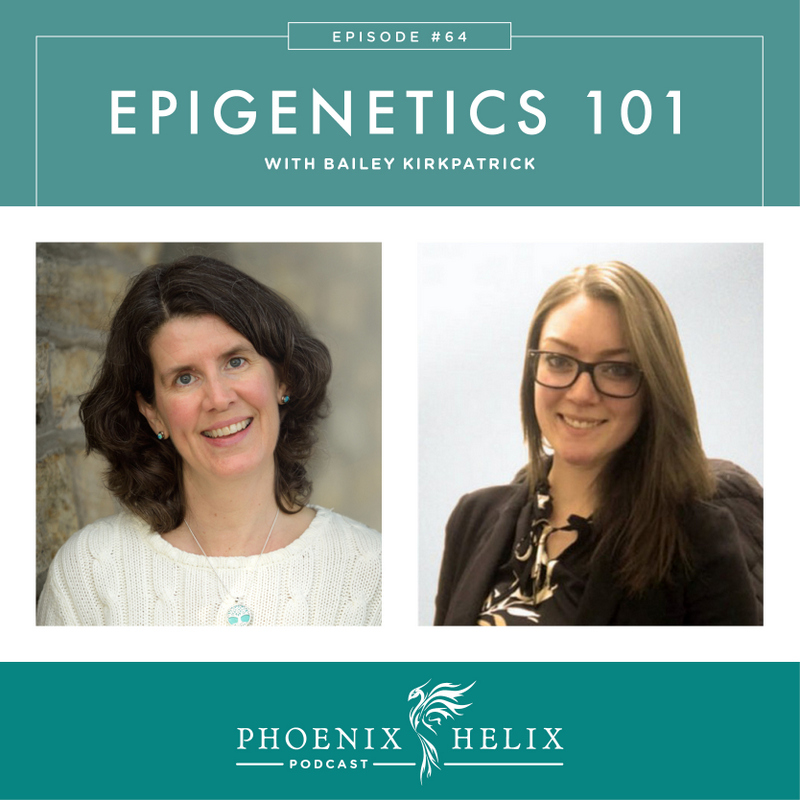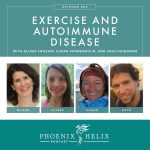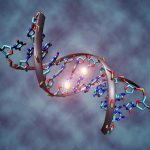
Are Our Genes Our Destiny? Can We Overcome Them Altogether?
We are each born with a unique DNA footprint that does indeed influence our life. It’s why we often look like our parents (or a forgotten great aunt). It contains both our health strengths and vulnerabilities. It can even influence behavior (the worrier vs. warrior gene, for example). But here’s something very important: our genes are interactive. The choices we make every day influence which genes get turned on and which genes get turned off. This is the science of epigenetics, and it’s why the paleo diet and lifestyle can have such a powerful influence on our health. For example, when exposed to an inflammation trigger (like food intolerance, lack of sleep, stress, etc.) several hundred genes get activated that increase inflammation bodywide. Similarly, when we eat a diet that supports our health, get plenty of sleep, and take time to address the stress in our lives, we are turning those same genes off again. How cool is that? It’s incredibly empowering. However, this doesn’t mean it’s a magical path to a cure (as the internet sometimes claims). In this episode, we dive into the real science of epigenetics and separate the myths from the truths and discover where we can make a difference! Our guest is science writer and research expert Bailey Kirkpatrick from the website: What Is Epigenetics?
Listen to the Show
- Subscribe to my podcast through your favorite podcast app: iTunes, Stitcher, Google, TuneIn, Spotify, Amazon, etc.
- You can also listen to the episode right here through the player below, and if you subscribe to my newsletter you’ll get notified of future episodes.
Podcast: Play in new window | Download
Show Notes
- Intro (0:00)
- Thank You for Over 100 5-Star Reviews in iTunes! (1:49)
- In the last podcast, I mentioned that I was close to 100 reviews and asked your help to push me over the top. You came through in spades! The more reviews my podcast has, the higher iTunes ranks it in searches, and the more people find it and learn about autoimmune healing. It takes a village! If you’d like to write a review, here are step-by-step instructions. And here’s a quick link to my podcast in iTunes: http://apple.co/2g5ugZq.
- Last Chance to Vote for Me in the Paleo Magazine Awards (2:42)
- Update: This podcast won 3rd place. Thank you!
- I am honored to be nominated in 3 categories:
- Best Podcast – General Health
- Best Podcast – Science
- and Best e-book: The Paleo AIP Instant Pot Cookbook.
- Thank You to Our Podcast Sponsor – Paleo on the Go (3:20)
- A frozen meal delivery service, they have a large menu of items for the paleo autoimmune protocol (AIP).
- Use the code PHOENIX for 10% off your first order.
- Meet Bailey (4:02)
- Bailey Kirkpatrick is a science writer who specializes in relaying important research findings to the general public, in easy-to-understand language. She does this as a writer for the website: What Is Epigenetics? She also works for Epigentek, a biotech company that supports epigenetics research around the world.
- Her interest in this field has led her to make changes in her personal life to maximize the epigenetics of her own body. Meditation, in particular, she feels is especially beneficial to her health.
- Genetics vs. Epigenetics (5:12)
- Genetics = the DNA sequence we are born with. Resource: Is DNA Testing Worthwhile?
- Epigenetics are the factors that influence the expression of those genes. Video: The Epigenome at a Glance.
- We are learning that our genes aren’t necessarily our destiny. The choices we make in daily life can impact them beneficially for our health. This is something the paleo autoimmune community experiences every day. Resource: Healing Stories.
- The History of Epigenetics (10:13)
- Dr. Conrad Waddington coined the term epigenetics back in 1942 when he discovered how cells differentiated. Since then, the field has expanded, and modern research focuses on how the environment (our choices and our experiences) affect genetic expression and even whether those epigenetic changes can be inherited along with DNA. It’s the old nature vs. nurture debate at the genetic level, and the answer lies in the combination of the two.
- The Epigenetics of Meditation (13:09)
- Recent research shows that meditation can:
- Decrease the expression of pro-inflammatory genes.
- Help maintain telomere length, which is linked to health and longevity.
- Inactivate genes known to cause cancer.
- Resource: 3 Epigenetic Reasons to Meditate Your Stress Away
- Recent research shows that meditation can:
- The Epigenetics of Autoimmune Disease (17:45)
- This is a very new field of research, but here are 2 compelling studies related to rheumatoid arthritis:
- Epigenetic differences in cells lining different joints influence patient response to RA medication, especially when it comes to pain remaining in certain joints. Resource article.
- Wutou decoction – a traditional chinese herbal mixture – was shown to epigenetically turn off inflammatory genes in rats. Resource article.
- This is a very new field of research, but here are 2 compelling studies related to rheumatoid arthritis:
- Myths Vs. Truths in the Field of Epigenetics (26:16)
- Scientific exploration requires a blend of hope and skepticism. This is a very new field of research, which means very little has yet been proven. In fact most of the studies have been done in vitro or in animals, not in humans.
- Epigenetics is a potential powerful component in human health, but it’s not the whole picture. Genes do play a role as well. While we can influence our genes, that doesn’t mean we can dismiss the effect of DNA altogether.
- There are people on the internet who prey on the vulnerability of people with severe illness and tell them they can cure themselves with their thoughts, or with whatever technique they’re selling. These claims start with a seed of scientific truth and exaggerate it far beyond what’s proven to be true.
- Harness the power of positive thinking without falling to the lure of magical thinking. Positive thinking can be part of an empowered approach to health. Magical thinking promotes disease denial, which can cause more harm than good.
- Resource articles:
- The Debate on Inherited or Transgenerational Epigenetics (35:45)
- This is the theory that the choices we make impact not only our own health, but that of our children and grandchildren. And conversely, that we have inherited epigenetic markers from our ancestors. It’s an overwhelming idea, and the science is “out” on this. Some people believe there is evidence to suggest this is true; others say not.
- Resource article: Transgenerational Epigenetic Inheritance: myths and mechanisms.
- Epigenetics of Diet & Lifestyle (46:47)
- While the science is preliminary, it’s pointing in some pretty hopeful directions. Here are some compelling studies:
- The Meaning Behind the Name: Phoenix Helix (50:39)
- The phoenix represents our ability to rise. The helix represents the power we have over the expression of our genes.
- Outro (51:39)
- Bailey Kirkpatrick is a science writer for the website: What Is Epigenetics? They’re a great website to follow to keep up with epigenetics research. If you’d like to dive deeper, Bailey also recommends the website: Science Daily, the book: The Epigenetics Revolution and the free online course: Epigenetic Control of Genetic Expression.
- Eileen (your podcast host) is the author of multiple books, written to help people thrive with autoimmune disease. Learn more on the Books Page.
- If you like this podcast, follow or subscribe through your favorite podcast app. You can also subscribe to Eileen’s biweekly newsletter.
- Check out the entire archive of podcast episodes.
You May Also Be Interested In
Spreading the Word
If you like the podcast, please leave a positive review in iTunes. It would mean the world to me, and also helps others find the podcast. Here are some quick instructions using your iPhone:
- If you are already subscribed to my podcast: (1) Click the purple podcast icon. (2) At the bottom of the screen, click Library. (3) At the top of the screen, click Shows. (4) Click the Phoenix Helix podcast image. (5) Scroll down the page, and you’ll see Ratings and Reviews. Scroll down a little bit more and click on Write a Review. This will bring up the review screen. Tap 5 stars (if you love the podcast), and then click in the title box, and it will bring up the keyboard. Enter a title and short review. (6) Click Send in the upper right corner. (7) Thank you! Positive reviews give the podcast a higher search ranking in iTunes, helping people find it and letting them know it’s a quality podcast and worth their time to listen.
- If you haven’t subscribed to my podcast: (1) Click the purple podcast icon. (2) In the lower right corner, click the magnifying class. (3) Type Phoenix Helix in the search box. (4) Click the podcast cover in the Show list. (5) If you’d like to subscribe, click the + sign at the top of the screen. (6) To write a review, scroll down the page, and you’ll see Ratings and Reviews. Scroll down a little bit more and click on Write a Review. This will bring up the review screen. Tap 5 stars (if you love the podcast), and then click in the title box, and it will bring up the keyboard. Enter a title and short review. (7) Click Send in the upper right corner. (8) Thank you! Positive reviews give the podcast a higher search ranking in iTunes, helping people find it and letting them know it’s a quality podcast and worth their time to listen.








I’m thinking about accessing services with Jay Goodbinder of the Epigenetics Center in Overland Park, Ks. I know you have written about pseudo epigeneticists in the past. Do you know anything about Dr. Goodbinder?
Hi Mary Beth. I have no knowledge of Dr. Goodbinder – positive or negative. I’ve written an article about what I believe constitutes a good functional medicine practitioner. I recommend giving that a read and then at your first appointment, assessing his recommendations with those qualities in mind. I hope he’s a good one!
Would you be willing to coauthor a book? Epigenetics our families seven year journey to normalacy
Hi Wendy. Thank you for asking, but I’m not interested in coauthoring any books. An excellent professional coauthor is Eve Adamson. She has co-written all of Terry Wahls’ books. If this question is directed at Bailey instead of me, you can reach her through the website: What Is Epigenetics?